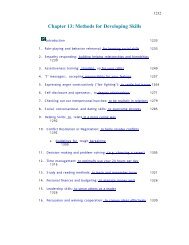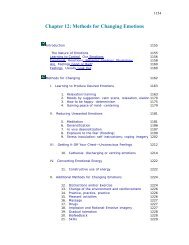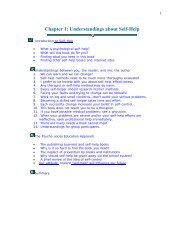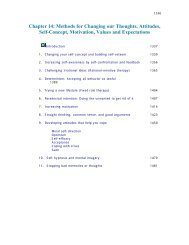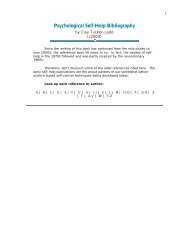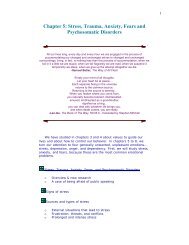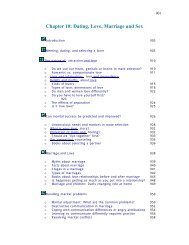Chapter 3: Values and Morals:Guidelines for living - Psychological ...
Chapter 3: Values and Morals:Guidelines for living - Psychological ...
Chapter 3: Values and Morals:Guidelines for living - Psychological ...
Create successful ePaper yourself
Turn your PDF publications into a flip-book with our unique Google optimized e-Paper software.
4. They told me to do it --"They talked me into going with<br />
them." "I am told what sales pitch to make, don't blame me if it<br />
isn't all true." "He/she just kept pushing until I gave in." "I do<br />
whatever the law says to do; if I was supposed to do more they<br />
would tell me to." See statement #5 above.<br />
5. Denial of responsibility --"I just went along with the crowd."<br />
"I felt certain someone else would help her, there were people<br />
all around." "One person like me can't do anything about<br />
poverty." "I'm going to cheat on my taxes because of all the<br />
free-loaders on welfare." See statements #5 <strong>and</strong> #6 <strong>and</strong> #7<br />
above.<br />
6. Denial of consequences --"I just dropped the bombs on the<br />
coordinates I was told <strong>and</strong> flew back to the base." "I only<br />
shoplift from big chain stores; they never miss it." "Paying<br />
farmers to not grow food doesn't really affect hunger." "TV just<br />
sensationalizes about hunger; there is enough <strong>for</strong> everyone to<br />
eat."<br />
7. Dehumanization --"There is nothing wrong with taking their<br />
l<strong>and</strong>; they are just savages." "If they are that dumb, it's their<br />
fault they are taken advantage of." "Those godless Communists<br />
kill anybody in their way; we'd better get them be<strong>for</strong>e they<br />
knife us in the back." See statement #8 above.<br />
8. You (the victim) caused me to do it --"If you hadn't been so<br />
nasty, I wouldn't have hit you." "You seemed like you were<br />
mad, so I went out with _____." "Those poor countries would<br />
take over this country if they could, I wouldn't give them a<br />
damned cent!" "The poor cause their own problems." See<br />
statement #8 above.<br />
B<strong>and</strong>ura believes that most inconsiderate, immoral behavior is due<br />
to these self-excusing mental mechanisms rather than a faulty value<br />
system. So one could "believe in" <strong>and</strong> espouse a highly moral<br />
philosophy of life <strong>and</strong> still find many ways to cop out. "To thy own self<br />
be true." Hopefully, by recognizing some of these defense or escape<br />
mechanisms, i.e. ways to escape from your own conscience, you are in<br />
a better position <strong>for</strong> judging if you are being cognitively honest with<br />
yourself <strong>and</strong> behaviorally true to your values. Do you use any of the<br />
rationalizations above? See chapters 4, 11, & 15.<br />
Pitfalls: repressing our moral st<strong>and</strong>ards or remembering our morals<br />
only if we are observed<br />
Besides using rationalizations to avoid the responsibilities imposed<br />
on us by our own morals <strong>and</strong> values (remember the Golden Rule is<br />
very dem<strong>and</strong>ing), we may have experiences that desensitized us to<br />
human cruelty <strong>and</strong> suffering. As Jerome Kagan (1984) observed, we<br />
are in danger of loosing our moral st<strong>and</strong>ards when our emotional<br />
reactions decline, e.g. when we see violence on TV or in horror movies<br />
<strong>and</strong> are not repulsed, when we see starving children <strong>and</strong> do not<br />
scream "this must stop," when we realize that someone is cheating on<br />
taxes, a test, or their spouse <strong>and</strong> let it pass. Negative emotions-indignation<br />
when injustice occurs--are a vital part of being moral. We<br />
33




